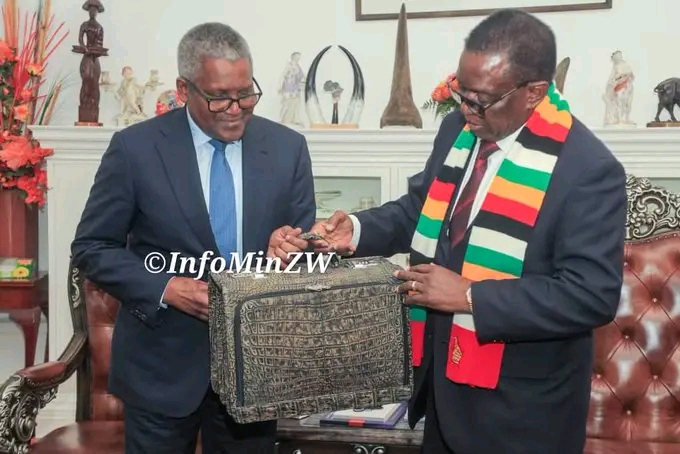Deputy Chief Secretary for Finance, Administration, and Human Resources in the Office of the President and Cabinet, Mr. Zvinechimwe Ruvinga Churu
By Dickson Bandera
The Government of Zimbabwe has declared that monitoring, evaluation and learning (MEL) will no longer be treated as a mere technical process but elevated to a national priority to drive results-based governance, inform policy shifts, and deliver measurable development outcomes.
Monitoring, Evaluation and Learning (MEL) is a systematic process that helps organisations and governments measure what they do, understand how well they are doing it, and apply lessons learned to improve future performance. It involves collecting and analysing data on activities, outputs, and outcomes to track progress, demonstrate accountability to stakeholders, and adapt strategies and policies to achieve better results over time.

In recent years, the Government has intensified its developmental agenda, pursuing progress across all sectors of the economy under the National Development Strategy 1 which is now moving into NDS2. These deliberate push aligns with the national vision of attaining an upper-middle-income economy by 2030.
Speaking at the close of the inaugural Monitoring, Evaluation and Learning Week in Harare this Friday, Deputy Chief Secretary for Finance, Administration, and Human Resources in the Office of the President and Cabinet, Mr. Zvinechimwe Ruvinga Churu, described the milestone gathering as a turning point for Zimbabwe’s governance culture.
“Ladies and gentlemen, we leave this week with some undeniable truths — that monitoring, evaluation, and learning is not merely a technical exercise, but it is a critical enabler to good governance. It is a tool for investment assurance and a foundation for more effective policy implementation,” said Mr. Churu.

He stressed that when government prioritises MEL, it strengthens Parliament’s capacity to fulfil its constitutional role.
“When government prioritises monitoring, evaluation and learning, Parliament has the right data to carry out meaningful oversight and budgetary scrutiny. This makes strengthening MEL systems a direct investment in democratic accountability,” he said.


He added, “Parliament must be supported in mainstreaming MEL into its legislative oversight and budget review functions to ensure that data meaningfully inform debate, resource allocation, and accountability.”
Mr. Churu also underscored that robust, credible data is vital for the private sector and for development partners to achieve their goals.

“The private sector relies on reliable data to de-risk investments, understand market dynamics, and make evidence-based decisions. Development partners operating within constrained budgets are demanding results-based reporting and clear evidence of learning to ensure aid effectiveness and accountability,” he noted.
Departing from his prepared speech, Mr. Churu challenged practitioners to stop blaming shortcomings on a lack of political will, making it clear that President Emmerson Mnangagwa and his administration are committed to seeing progress.
“Again, off the script, let me point out — we as practitioners in Zimbabwe have a tendency of blaming our failures on what we call political will. The political will is very there. Let me just emphasize that. So let’s do our work,” he said.

In his address, Mr. Churu outlined five strategic priorities to transform Zimbabwe’s MEL culture. These include strengthening parliamentary oversight, forging structured partnerships with the private sector, aligning development cooperation around a unified results framework, and shifting from activity-based reporting to impact-focused delivery.
“We must shift the culture from activity to impact — institutionalizing a results-driven mindset where success is measured not just by outputs, but by outcomes. This involves promoting high-quality evaluations, real-time data use, and open dissemination of findings to enhance learning and transparency,” he said.

He further emphasised that sustainable domestic financing and digital innovations are critical to maintaining momentum.
“Achieving these goals depends on sustainable financing for monitoring, evaluation, and learning. We must establish robust domestic financing mechanisms supported by technical assistance and digital innovations that strengthen data systems and institutional capacity,” said Mr. Churu.
Rallying all stakeholders to translate commitments into measurable action, Mr Churu urged them to sustain the momentum and deliver tangible results.

“Let’s implement and let’s seek outcomes and impact in everything we do. Let us not allow this momentum to fade. Let us translate dialogue into policy shifts and policy into measurable impact. The future demands that we plan better, we measure better, and we learn faster. Let us be the champions of that change,” he urged.
The inaugural MEL Week brought together policymakers, practitioners, parliamentarians, and development partners to reinforce a shared commitment to data-driven governance, stronger accountability, and accelerated national development.


